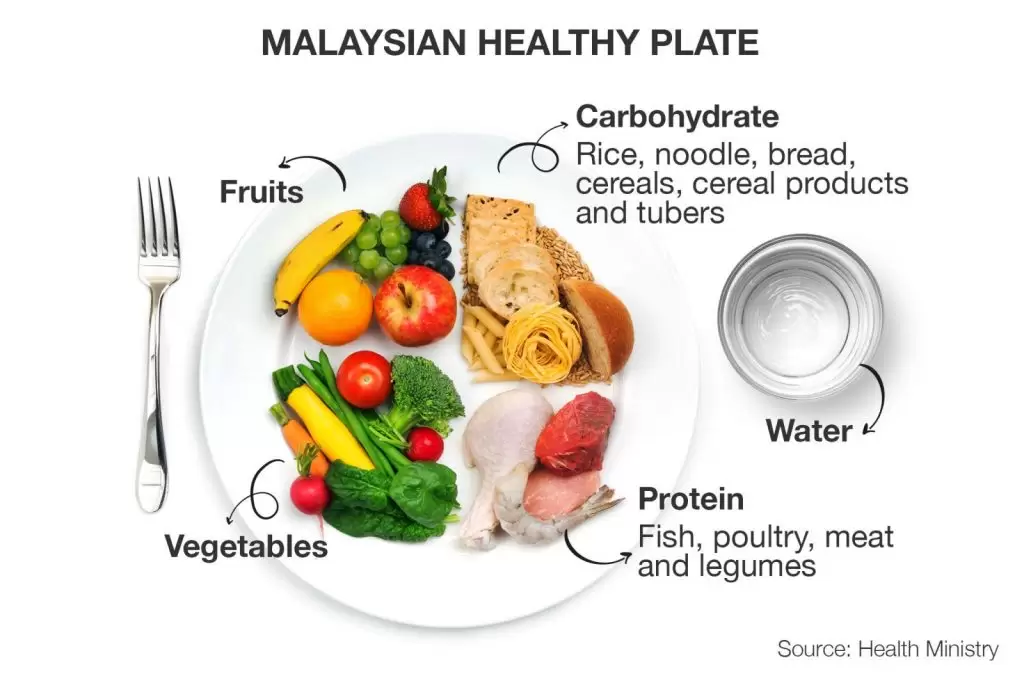
Dialogue with Ms Rozanna (UMSC Head of Dietetic)
Jun 19, 2019
Part 1: What’s in a good daily diet?
Question
Q1. What constitutes a good daily dietary intake?
A: According to the Malaysian Dietary Guideline, a healthy, balanced diet requires various food choices from each of the food groups. The right amount of nutrients needed to maintain health can be achieved by consuming whole grains, a variety of fruits and vegetables, lean meats, poultry, fish, eggs, nuts and healthy fats in the right quantity as recommended.
Q2. What does the “new” Malaysian Healthy Plate constitute?
A: THE Malaysian Healthy Plate translates the recommendations from the food pyramid and Malaysian Dietary Guidelines.
- Step 1: Using a 10-inch (25cm) plate as guideline
- Step 2: Fill the first quarter with carbohydrates foods in this category include rice, noodles, bread, cereals and wholegrain products.
- Step 3: Fill the second quarter with a protein source such as meat, fish, beans, eggs, nuts, legumes and tofu.
- Step 4: Fill the other half of the plate with vegetables and add one serving of fruit such as apples, oranges, papaya. This ensures a diet rich in fibre and all the essential vitamins and minerals.
- Step 5: Finally, complete the meal by drinking a glass of water. Staying hydrated is just as important as eating a balanced diet.
What a healthy meal looks like

Q3. How can busy individuals who are always on the go ensure their well-being to live stronger and better?
a. HAVE HOME-COOKED MEALS
One of the best ways to eat healthy is to cook at home. Having more home-cooked meal, you can control the ingredients you use, creating a more nutritionally-balanced meal.
b. PLAN YOUR MEALS
Planning your meals for the week will help you have a better idea on what to buy and stock up on. Many people waste money by over-buying produce and then throwing them away when they rot or become over ripe.
c. BUY FRESH PRODUCE
Buy more fresh produce than processed ones. Processed foods may seem more convenient, but they come at a price and with a lot of more added ingredients that have an impact on your health such as food additives, salt, sugar and colouring.
d. CHOOSE MORE LOCAL PRODUCE
Good nutrition comes from eating various foods such as grains, proteins, vegetables, fruit and dairy.
Local produce is just as nutritious, if not more. For example, a guava has a higher amount of dietary fibre and vitamin C than an orange.
e. USE OTHER PROTEIN FOOD TO REPLACE MEAT
Choosing more plant proteins to replace meats is a good way to cut down on consuming too much cholesterol and saturated fat.
For some of your meals, consider having other protein-rich foods to replace meats such as beans, legumes, eggs, milk, tofu, nuts, canned fish or anchovies.
Protein from plant sources such as beans, legumes, nuts and seeds are also cholesterol-free and lower in saturated fat than meats.
f. PACK YOUR LUNCH
Another advantage of cooking a little extra is that you now have the option of packing food to work. Leftovers make a great lunch for the next day.
Ms ROZANNA M.ROSLY
HEAD OF DIETITIAN OF UNIVERSITY MALAYA SPECIALIST CENTER
Ms Rozanna graduated from Leeds Metropolitan University with a Bachelor of Science degree with second-class honours (1st division) in the year 2000.
Rozanna started her career in the year 2000 as a product specialist for 2 years. Then, she joined Sunway Medical Centre (Sunmed) as a Clinical Dietitian. Being recognized for her expertise as a dietitian, Ms Rozanna was hired as a senior dietitian at Jerudong Park Medical Centre, Brunei Darussalam in June 2006 and was promoted to Chief Dietitian and Head of Dietetics and Food and Beverage Department in July 2009.
Rozanna is now the Head of Dietetic Services at University Malaya Specialist Centre. She provides counselling, educates the public on general nutrition for children, women and the elderly.
For more information on how to incorporate good daily diet with MEGA -C Plus Bioflavonoid : https://biolife.megawecare.com/product/general-health/mega-c-plus-bioflavonoid-gh/



